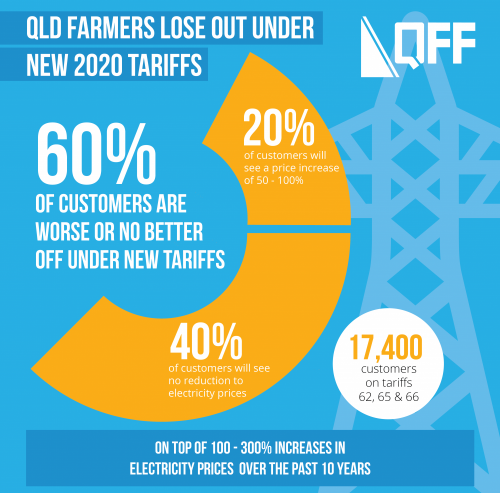 Queensland farmers, particularly irrigators, are painfully aware of the elimination of irrigation and small business tariffs from 2020 – forcing them on to costly demand/time of use tariffs. Yet farming systems, water licences and irrigation equipment are, and for now will continue to be, designed around current tariffs. These changes are going to be costly, and in some cases, require expensive farm redesigns to accommodate the new tariffs.
Queensland farmers, particularly irrigators, are painfully aware of the elimination of irrigation and small business tariffs from 2020 – forcing them on to costly demand/time of use tariffs. Yet farming systems, water licences and irrigation equipment are, and for now will continue to be, designed around current tariffs. These changes are going to be costly, and in some cases, require expensive farm redesigns to accommodate the new tariffs.
Current electricity pricing policy allows networks to burden customers by passing on the costs of inefficient and, in some cases, redundant infrastructure investments. These costs are forcing many irrigators to go off grid, with diesel power often the most affordable immediate option.
Many questions still exist around whether the design of the new tariffs encourages energy efficiency or reduces network congestion to assist with managing demand for future network investment. An independent report commissioned by Queensland Farmers’ Federation (QFF) member CANEGROWERS (the ‘Sapere Report’), concluded that the design of the proposed ‘cost-reflective’ tariffs were inefficient and do not avoid network congestion.
QFF recognises that we need a suite of appropriate tariffs which meet the need of food, fibre, fuel and foliage producers – a ‘4F Tariff’ – tailored to the unique needs of producers and built on regional electricity policy frameworks. These tariffs will need to drive efficient end of network demand and avoid electricity users moving off the grid which will compound the issue of declining network utilisation.
The trial is also assisting farmers to monitor and understand their electricity use so that in 2020, it is possible to make an informed choice as to which tariff or selection of tariffs will have the least cost impact. This trial will identify the potential for offering controlled load and demand tariffs as an alternative to the current transitional tariffs.
This article was compiled by QFF as part of its four-part series looking in to how the state’s electricity network can be improved to better service and support the agricultural sector.